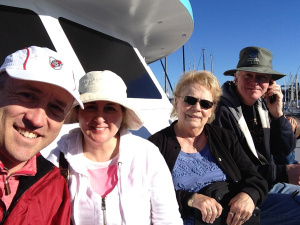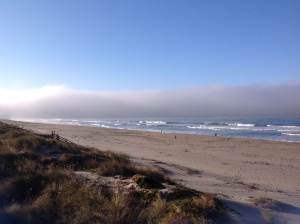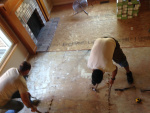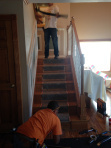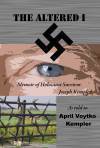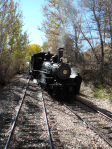April Voytko Kempler's Blog, page 3
November 18, 2015
The Edge of the World Beckons and I Am at Once Soothed
One of the things that saddened me the most about moving away from southern California, was saying good bye to the ocean. A day trip to the beach was part of my routine growing up, now I have to make special plans to see the sand and surf. Thankfully we have the capability of traveling anywhere we like, so we make it a point to get to the ocean every now and then.
Going on a vacation to a place you really love can be very therapeutic, trust me. I’ve been having some health issues this year, mostly due to stress and tension, but I’m managing with medicinal help. This isn’t really good enough for me. Although I value the medicine I know it’s just a crutch, or a mask. My goal was to get this thing licked in six months and get off the medication entirely, but like all my other deadlines it passed by with a rushing breeze. So, I have to be patient. In the meantime, to remove some of the stress and decompress, Paul and I traveled to one of my very favorite places on this earth, and surprisingly not too far away from home: Watsonville, California.
Watsonville may not sound like a recognizable name to you. It’s a small agricultural town between Santa Cruz and Monterey. We stayed on the Pajaro Dunes along the coast, right on the Monterey Bay. This is a where the magic happens. Pods of dolphins swim and play and surf the waves. Otters search for whatever it is that otters search for right between the breakers. Shore birds are numerous. I love watching them, they remind me of me running away from the waves trying not to get doused.
This is a gorgeous morning view. I felt an instant calm, in fact, I’m feeling an instant calm just looking at this photo!
We couldn’t pass up an opportunity to vist the Monterey Bay Aquarium, a beautiful and awe-inspiring experience. The special exhibit is Tentacles, and I have to say it is very cool.
 I believe there is an octopus in here somewhere!
I believe there is an octopus in here somewhere!
The penguins are always a lot of fun to watch.
I will be honest, the otter feeding is my absolute favorite part! Otters are the most adorable creatures I’ve ever seen. Did you know otters have one million hairs per square inch? That’s one house cat in one square inch! Amazing.
Not to be missed are the tide pool areas, including the sandy shore and aviary.
These gorgeous creatures were in the touch pond area. Although we weren’t allowed to touch this little shark and stingray, we could pet the bat ray’s. I managed to touch one and he (maybe she?) was so soft and velvety, a little smelly though, like sulpher, not sure why. I guess I should have asked, there were plenty of volunteers only too happy to explain things.
We made it back in time for drinks and a stunning sunset.
A definite must-see excursion is whale watching. We were told by so many people that they saw whales in abundance. We just had to see this for ourselves, so we headed to Moss Landing to begin our adventure. We managed to see quite a few tails, spouts and humps as the magnificent creatures dove deep, but no breeches. I did see the most magical rainbow in one of the whales spouts. I wish I had a picture of that…We still had an awesome experience and I recommend it to anyone!
 This is another whale watching boat, but I figured this must be what we look out on the briny sea!
This is another whale watching boat, but I figured this must be what we look out on the briny sea!
I would have liked to see a whale up close, but we saw many many seals and birds!
And did I mention how mesmerizing the ocean is by moonlight?
I couldn’t get enough of this view. I never felt more calm in my life. So, if you can go to the ocean, do so, it is a wonderful balm for the heart.
“hark, now hear the sailors cry,
smell the sea, and feel the sky
let your soul & spirit fly, into the mystic…”
– Van Morrison

November 9, 2015
A Wedding Anniversary
We are remembering Joe and Virginia today as they share fifty-two years of marriage. Virginia and Joe daily read a Scriptural text to help them have a spiritual bent to their day. Joe looked down at the date and looked back up at Virginia to say Happy anniversary! To which she replied, Thank you, and went over to give him a kiss. For someone with the kind of memory issues Joe has, this was heart-warming to hear. We wish them a very happy day!
“A Successful marriage is an edifice that must be rebuilt everyday.” – Andre Maurois

October 28, 2015
You Are Telling an Important Story
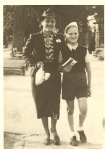
Joseph Kempler and his older sister Dziunka (Judy) Laub
Last night I received the sweetest email from a reader of THE ALTERED I: MEMOIR OF JOSEPH KEMPLER, HOLOCAUST SURVIVOR, and I wanted to share it. I might add that Deb, the writer of the email, is also compiling her father’s memoirs into a book. Reading Deb’s words touched me to the heart. I feel sad that her father had to walk a similar path and endure all the horrible things Joseph did in order to survive, but I feel connected in some way by the shared memories of a father who went through the Holocaust.
To ensure the information Joseph gave me was reliable and accurate I researched diligently, giving all I could to the task. I had to dig deep, so it is always reassuring, and validating when I get feedback saying exactly that! It isn’t that I wrote such an important story, it’s important information that must be related accurately. To speak the truth is a heavy responsibility for any writer of history, but to track down the facts is equally important for such a topic as the Holocaust. I never want room for doubt that the Holocaust didn’t happen.
I hear often, and honestly it’s too often, how some young people today are being taught by their parents that the Holocaust is a myth, a legend, a fabrication. I struggle to understand this belief. So each time a young person has an opportunity to learn the truth, that is a victory. I encourage young people to read more memoirs of survivors. Not only of Holocaust survivors but read the memoirs of people who saved others who weren’t Jewish and could have been killed. Read the memoirs of soldiers who were there and witnessed it all. There are countless books written by people who were in the concentration camps, not only as prisoners-of-war, but as people who worked for the Nazis and who saw, and sometimes took part, in the atrocities taking place. Also, there were many others imprisoned in the concentration camps who weren’t Jewish but suffered alongside for their crimes against the state. Reading from various viewpoints and backgrounds will give a fuller understanding of that time and hopefully will substantiate that the Holocaust was real.
I realize this is getting more rare, but when a Holocaust survivor visits a school a student should view this as an opportunity to ask their questions and get answers from the source.
Joseph and I have some upcoming Holocaust presentation events where people, old and young alike, can meet him personally, (shake his hand!) speak to him and feel connected to that particular time in history. Yes, it’s a hard history, which none of us likes, and would rather didn’t happen, but it’s important to keep it fresh in our minds because it truly wasn’t that long ago.
As time progresses and these survivors and soldiers who fought for their liberation die, so does the intensity of that event.
My words seem inadequate so I will let the letter explain everything.
(edited)
Dear April
I am reading the book you wrote about your father in law. This is unbelievable, the dates and journey your father in law took was the same as my dad. My dad was in ghetto in Boryslaw then forced labor then Plashow to Mathausen (dates match up with my father’s transport) to Melk, eventually to Ebensee where he was liberated. My dad met a soldier years later who liberated Ebensee.
In 2007 to the date of his liberation I found his brother’s children. My dad believed his brother was killed in war. When his area was annexed to Russia his brother was drafted. The last my dad heard before he went to Plashow that his brother was severely wounded. After the war he contacted Russian military and there was no record of his brother. Can you believe the Russians changed the spelling of his first name by one letter and because of that he could not be found.
My dad is going to be 90. He still plays tennis goes to gym a few times per week.
You are telling a very important story. I am humbled by your dad’s experiences. Your book is unique in so far as your father in law acknowledged what he had to do to survive. People don’t talk about that. Very painful.
How is he doing?
I will finish his book probably tomorrow.
Excellent job
Warm Regards,
Deb

June 17, 2015
Holocaust Narratives Didn’t End at Liberation–Displaced Persons Camps
Many people don’t realize that the stories of Holocaust survivors continued months and years after they were liberated from concentration camps. Many of these survivors, including prisoners of war, had no homes or families to return to. What happened to them?
Millions were placed in what is called Displaced Persons camps. These institutions were difficult and challenging in themselves. Anti-Semitism still abounded. Living quarters were cramped with little privacy. Sometimes only a threadbare blanket separated individual families from each other. These close, and often unclean living conditions bred sickness.
In addition to physical discomfort, there were the emotional and mental anxieties bearing down on the survivors weakened shoulders. This was termed survivor’s guilt. Some displaced persons, wishing for a reunion with their family members went so far as to fantasize against all evidence that one of their family members had survived and was still living, or perhaps waiting for them in another country overseas. This type of thinking never went away and many carried the burden of guilt until they died.
Source: DPs Europe’s Displaced Persons, 1945-1951 by Mark Wyman
The Wild Place by Kathryn Hume
The Altered I: Memoir of Joseph Kempler Holocaust Survivor, as told to April Voytko Kempler
Read a sample from THE ALTERED I

April 15, 2015
I Sit Watching About a Hundred High Schoolers
Today I want to share an essay that Paul Kempler (my husband) wrote a little while back during a high school Holocaust presentation. I meant to re-blog his post but, I couldn’t seem to stop myself from simply writing an introduction to his exceptionally moving piece, and wrote my own blog post here.
A friend of ours, who stumbled across the post by accident, told Paul that she had looked into his heart after reading his words. So before I run on and on, I present Paul’s thoughts on his father’s Holocaust presentation.
Hug High School Holocaust Presentation:
April and my dad spoke to students at a local high school today and while they spoke, I wrote down my thoughts on the event. I’m posting them here. I called it my creative writing assignment.
I sit watching about a hundred high schoolers. These aren���t the most refined kids. They are the type that are always being torn in different directions. Many don���t have complete families and what family they do have is sometimes very challenged. Drugs and gangs are never far from the world that they live in. Often, their teachers say, they are disinterested and disrespectful.
These young ones sit in rapt attention. They are listening to a story of a man who endured many trials and this interests them. He is a holocaust survivor from Poland. When he talks of near starvation, beatings, hard labor and survival, they listen. Maybe the world they face isn���t that different from what this man���s experience is. He claims that his only thought was how to survive that minute. You didn���t think about the future. If you did, it was a death sentence. For to feel, was to allow emotions through and emotions were a recipe for death. These children or young adults in the high school auditorium can certainly relate to this. The modern world creates distance. What young one today really feels comfortable with their own emotions. If their experiences don���t damage them enough, so many are actually causing harm to themselves due to the need ���to feel���. Cutting, addictions, even suicide are on the rise. This old man speaks to their hearts. They don���t fidget, they don���t whisper, they don���t sigh. Their eyes and seating inclination are both forward.
These are history students. Usually, there is a great disconnect from what they learn. So many years have passed. In this case, though, history comes to life in the person of an 87 year old man who lived through an important part of history. Some people deny that his story, like so many other holocaust survivors, is based in fact. Once these living historians are no longer with us, it becomes easier for those who challenge the story to gain traction for their statements. So, even though this man struggles to speak clearly and fluidly, it is important that he pass on this information to the newest generation. He tugs at his sportcoat lapels, tries to sit up straight as though this action will trigger his mind to return to the times when his photographic memory brought every detail to his tongue. It doesn���t work anymore. The twirling of his thumbs in a circular motion while the rest of his fingers are interlaced doesn���t work either. He tries smacking his lips and tongue, making small noises. But they don���t bring to mind the words either. He has a spokesperson though; his daughter-in-law. She spent 6 years interviewing him, chronicling the account of his life and tabulating all the information into a written document. She knows his story better than he does now. It is a shame that he is a shell of his former self, but it may have benefits too. If there was something traumatic you wanted to put behind you, memory and cognitive issues might be a blessing in disguise. He still claims to not sleep and have nightmares based on his past, but under these circumstances, he struggles to tell these children many specifics. His memoirist fills in the gaps for the eager ears in the auditorium.
Questions that the students asked were varied in content:
Did you ever go back to visit your home town? Was it hard to go back?
What did you weigh after the war?
If Hitler were here, would you forgive him?
What was the first time you saw a dead body and how did it make you feel?
Were any of the soldiers nice?
Would you like to take revenge if you could?
What happened to your family?
Did you ever think about escaping?
What motivated you to survive?
What do these questions teach us about the students? They want to connect with family. They want to believe that there is good in all people. They want to believe that there is a way out of any situation.
These are common threads to humanity. We all face similar challenges and evils, regardless of our background. I���m guessing that the children that sit in this room with the Survivor don���t have access to special treatment in the world. Their backgrounds are very similar, though separated by 70 years and the Atlantic Ocean. Both were very interested in their freedoms, though they were pressured from all sides. Both wished for closer connections to family. Both learn to survive using whatever skills or manipulations they can.
In the end, we are all damaged in some manner. The scars are not always visible. But, sometimes they are. Maybe it is a tattoo of a number on your arm, given while a prisoner in a concentration camp. Sometimes it���s a burn mark on your hand where an overzealous parent has put out their cigarette in an attempt at discipline. But these scars withstanding, the majority of damage we all endure is internal. It is good for these students to realize that no matter what we face, we have the opportunity to persevere through them. Conquer or overcome might be too strong of a word. This survivor has a special gift. He has developed something that helps him. Faith.
I���m not sure how these young students view faith. Do they possess it? The Survivor claims to have begun life as a practicing Jew, then as a result of his experiences a God-hater, then an atheist and finally religious again, via a different path. He claims that his search for ���God��� has helped him endure. Most holocaust survivors had a very different path when it comes to their relationship with a higher being. Most became quite anti-God, assuming that he had abandoned them. They returned the favor. This is a common reaction when having gone through something traumatic. The Survivor didn���t get on this road to faith until far after the war had ended. What will bring these students to the same place of faith? Will they ever grasp for it or will they rely on their own strength to overcome whatever comes their way? Only time will tell, but the story they are hearing provides a key to how to find that path. Maybe they recognize this. Why else would they pay such close attention? No one is looking at their phones or acting otherwise distracted.
Humanity is closely connected. In any group, there are leaders and followers. In this auditorium of young souls, some would have been Nazis and some would have been persecuted, while others would be observers. Would those observers have stood for what was right or would they looked away as atrocities occurred under their noses. (The smell of human flesh burning is pretty hard to ignore.) This is the message of the Survivor.

March 20, 2015
Holocaust Presentation at High School Prompts Insightful Questions from Students
Joe and I gave a Holocaust presentation yesterday at a local high school. This was challenging for me in several ways.
Typically, Joe and I will go to a school, or library, or other venue at a specified time and speak for roughly an hour or two, followed by a question and answer session. I enjoy this sort of thing. I’m always nervous, but afterward we have a jolly time interacting with the audience. And the book sale and signing is always a boost. But, recently I was asked by a teacher if Joe and I could speak to each of her World History classes in one day. Soon, other teachers wanted their classes to join in the discussion. One thing led to another, the presentation grew and grew, and it turned into a big day. Joe and I arrived early in the morning (7:30 a.m.) at the Little Theater on the school campus, and gave the presentation to each class period, there were seven of them! Each class period was 50 minutes long with anywhere between 50 to 150 students in the audience. I had thirty-five minutes to give Joe’s life story before opening it up to questions from the students, and then a five minute break in between before doing the whole presentation over again. Over and over, seven times.
What did I get myself into?! This was a bit more than I had anticipated, and I had never done this format before. Rising up early in the morning, making sure Joe had gotten up early, and making it to school on time for first period, was stressful in itself. Getting to school on time was never a goal I could reach for most of my school days, but now I had to do it with an 87-year-old Alzheimer’s patient.
Thankfully, I had a team of great friends behind me. My husband Paul, was a stronghold for me. My team from LeRue Press, Kathy and Tanisha, who arrived early with over 500 sample chapters excerpted from the memoir THE ALTERED I: MEMOIR OF JOSEPH KEMPLER, HOLOCAUST SURVIVOR, and bookmarks, plus several copies of the book on hand in case anyone wanted to buy a copy on the spot (which several did!) The teacher who organized the whole affair was a doll, enthusiastic, helpful and generous.
After the first three class periods I seemed to hit my stride and my focus. I wanted to convey a positive message to the students not just relate the sad events of Joe’s life. I wanted to show the students that they could stand up against peer pressure and racial prejudice and do the right thing despite the circumstances being intense.
Well, I believe it was a success. The questions from the students were incredible. These were some standouts for me:
If Hitler were here would you forgive him?
When was the first time you saw a dead body, and how did you feel?
Would you take revenge if you could?
What motivated you to survive?
If you had blond hair and blue eyes did that guarantee you survived? (A student noticed Joe had blond hair as a youngster from old photos I had running during the presentation.)
What do you think? Insightful right?
Despite a raging headache by the end of the school day, I felt relieved. Relieved it was over, but also happy with the students. They were quiet, respectful, and curious. After each class period there were several students who wanted their picture taken with Joe, or just to shake his hand. Some hugged him. It was adorable to see. Everything I had gone through emotionally and mentally in preparation for the presentation had been worth it for these students. I was glad Joe could do it too. I was concerned about him getting up early, (he fights it!) concerned about remembering his own history, concerned about his energy level, concerned about the kids understanding him, he is soft spoken, has a bit of an accent, and slurs his words more than he used to. My fears subsided as we got underway. Joe was a real partner. He was awesome. He only forgot what he wanted to say a couple of times and I was able to help him get on track and expand his thoughts.
I most likely will never do another all day presentation again. It was relentless–wash, rinse, repeat. Some times I got lost in my thoughts and couldn’t remember if I had said this or that. Each time was a little different, but for the most part I was on track. Near the last period, Paul whispered to me, “Keep it fresh!” I really have a new appreciation for what teachers go through each day, and I’ve determined I’m kind of spoiled … but in a good way.
I’ll be posting Paul’s thoughts on the day in a future post. It’s a wonderful essay and I can’t wait for you to read it!

October 9, 2014
Caughlin Fire: First-Hand Account of an Emergency Evacuation
Originally this article was submitted to Yahoo!Contributor, now off the Web, but it was my personal first-hand account of our evacuation from our home after a fire cut a swath through my neighborhood in the early morning hours of a cold and windy November. One man died of a cardiac arrest and at least 30 homes were destroyed.
I’ve been inspired to re-share my story ever since hearing about the fires that rampaged through California this past month, specifically the King Fire, which began September 13, and damaged thousands of acres, destroyed homes, and disrupted thousands of lives. The King Fire created unhealthy air conditions in Reno, NV, and ruined our otherwise beautiful crystal blue skies with a smoky, brownish haze.
I’ve lived through this type of devastation before, strangely enough. In 1997 our home was flooded. Not only did we have to evacuate in the early morning hours (why is it always in the middle of the night and in the winter time?) but our home was destroyed and had to be re-built from the sub-floor up and the ceiling down. It was awful and Paul and I both suffered from post-traumatic stress disorder, something we’ve taken years to recover from, but may never fully go away.
Recently I’ve discovered this particular piece was hijacked. I’m undecided if this is compliment or not, but since I don’t know what I can do about it anyway, I figure I should post it here on my blog and claim the article as officially mine. I feel quite free to bring it out of the shadows and to post for the readers.
Caughlin Fire
While enjoying a sound sleep I was semi-awakened by the smell of smoke. My first thought was that I had left a candle burning, my second was my husband had started a fire in the fireplace after I had gone to bed. Just go back to sleep, it’ll clear out. I dived deeper under the covers, but the smell became persistently stronger. Are the neighbors having a bonfire? What is going on? Begrudgingly, I shoved back the covers and went to investigate. The house was pitch black and I shivered in the cold. In the bedroom across the hallway I saw a faint glow flickering behind the window shade. I raised the shade and nearly passed out by what I saw. The ridge line west of my home was ablaze. Smoke and red flames licked the sky. My street was enshrouded in a veil of thick smoke. My God! The neighborhood is on fire! I opened my mouth to call out my husband’s name, but only a whisper croaked forth. After the third attempt I succeeded a shout: “Paul, wake up. There’s a fire!”
“W-h-a-a-a-t?” was his sleepy reply.
“Come look,” I said and directed his attention at the view through the window. This had the same affect on him as it had on me: instant alert mode.
I tried the light switch by the stairs but it didn’t work. “Great, we don’t have power,” I said. We padded downstairs and opened the front door. We were assaulted by a cold blast of smoky air that smelled foul with chemicals, housing materials, cars, and trees. Paul slammed the front door and we scrambled upstairs to the bedroom where we had a better view of the flames. We sat stunned and befuddled. What do we do? The wail of sirens from the fire trucks could be heard in the distance, getting closer to our neighborhood with every second. We knew others were aware of the fire storm at least.
Without power I couldn’t tell what time it was and we had no heat. We figured the fire was far away and we should just go back to bed where we could get warm. After a minute lying in in bed Paul said: “This is wrong. We need to do something!” He fumbled for his flashlight in the nightstand drawer, we put on our robes, and together we crept downstairs. Just then the phone rang. Paul answered it. After a series of “Really’s?” “Uh huh’s,” and “Okay’s,” Paul turned to me. “That was Janice. She said we need to get out of our house. The fire is big and it’s bad.” He reached for the Mag-Lite we kept in the kitchen drawer and handed it to me. I followed as he raced upstairs.
My head started to swim and I tried not to panic, but instead, concentrated on what I needed to bring with me. You’ve been through this before April, stay calm, concentrate! I grabbed some cash we kept in the drawer, my wedding ring, and a couple other pieces of jewelry that were important to me. Prescription medicine was next, and a toiletry bag.
“Now isn’t the time for cosmetics, April,” Paul said.
“Oh yes it is,” and tossed the cash, jewelry, moisturizes, and face creams into my bag. I have my priorities.
“Get dressed,” Paul said, and then he disappeared downstairs. I figured he was retrieving our “to-go” bag we kept in a closet under the stairs. Our church strongly cautioned us that disasters could occur anywhere and anytime. We needed to be prepared with an evacuation plan and some necessary provisions in case we had to escape quickly. Sound advice now that we were in the midst of a raging suburban fire. However, I was faced with the challenge choosing the proper evacuation attire. What does one wear to an evacuation? Certainly not the 5-inch platform stilettos I just purchased. They’re so cute, especially the black lace ones. Oh well, too bad I have to leave them behind. I pulled on a pair of jeans, my Ugg boots (they were my warmest and most comfortable), several layers of shirts, and then topped it with a reversible fleece jacket.
As I headed for the door I grabbed an unopened bottle of vodka from the pantry. If this house goes up in flames I might need this later.
As Paul and I loaded up the car I could see a flashlight beam bouncing off walls and windows in the house across the street. It gave off an eerie light as Megan, my neighbor, was preparing to evacuate her home with her two young children. Her husband was working a night shift so she was responsible for getting everyone out of the house. Adding to the trauma of having to leave our home in the early hours of a cold November morning was the howling winds. Leaves and bits of branches, and other debris were flying all around. I looked up into the sky and soot and ash were floating down on top of us.
“April, get important files and papers,” Paul said. I nodded, but then wondered, what’s important?
“I don’t know what to do. What do you want me to get?” I could tell I was starting to lose my mind. Focus. I ran into our home office and pulled open file cabinet drawers and grasped at files and documents I thought might be important, but really had no clue. Along with the files I gathered a stack of neatly folded afghans my mom had lovingly knitted. These were heirlooms, irreplaceable, I couldn’t possible leave these. Then I remembered the gloves, scarves and hats, and grabbed those too. I ran back out to the car with my bundle and kept shoving things in. Next, I found tote bags and began filling those with family photo albums, framed pictures and the like that were irreplaceable. I took a breath, and looked around, there was still time before the threat of fire was imminent. I ran back inside to see what else I could fit in the car. I pondered in front of a shelf on the wall, should I bring the dog’s ashes? Might as well. I scooped up their urns and turned to leave. Too late.
Paul came in stopping me in my tracks. “Really. You’re going to bring the dog’s ashes? That is important?” Paul said.
I guessed so, because I didn’t even stop to answer, and in the car they went. It’s remarkable how much you can actually fit in a car when paring down the paramount items of your life.
The wind shifted the fire away from us so we decided to wait a little longer to see what would happen before evacuating. I waved sad good-byes as each of the neighbors departed from their homes and drove off seeking shelter somewhere. I estimated I had been awakened from the smoke smell around 2 a.m. By 3 a.m. our car was sufficiently packed and ready. I was surprised at how little I took with me. I didn’t even bring any of my beloved hard cover books (or select paperbacks, for that matter). I was sorry to leave my library. The thought of all my books burning up in an inferno was a bitter ache in my heart. But, they’re only things, all replaceable.
For a little while it looked as if our house was out of danger. The sun had come up–finally, although a pale, watery, hazy imitation of itself. I amused myself by picking leaves from my sticky and stiff hair. The toll of the early morning hours made me sleepy, I lay down on the sofa and dozed off and on, while the radio station broadcast updates on the fire. I came out of a light nap when the newscaster said: “The fire has jumped across Ridgeview.” Ridgeview was just behind the neighbor’s house across the street. A creek runs between their home and the sidewalk. There is also a lot of dried overgrowth, perfect for a hungry fire. I jumped off the couch. Just then Paul came in. He had been guarding the driveway, keeping an eye out for smoke of pop-up fires.
“We have to go, embers are coming down now,” he said.
I followed him out onto the street, but just as quickly the wind shifted and the embers disappeared. Paul ran across the street and knocked on John and Kathleen’s door to let them know the fire was now behind their home. They invited us inside. They had been sleeping and had no idea how close the fire was. Looking out their back slider door I was transfixed by the flames, while behind me John and Kathleen scurried about the house and made a dash for their car to evacuate. Paul and I rushed out to their back yard where we saw Charlie, another neighbor who lived down the street, and around the corner from us. He was with REMSA and had been working since 2 a.m. when he got a call to help a man who had suffered a heart attack while evacuating his home. Charlie was down in the ditch with a long garden hose tamping down the flames. Another neighbor, Cody, whose wife and twin daughters had already evacuated, grabbed another garden hose and joined Charlie in defending the endangered homes. Charlie was the hero of our section of the block. If it wasn’t for him I’m not sure what would have happened to thoes homes. There were only minutes to act, and those precious minutes made all the difference. Charlie yelled for Paul to wave down a fire truck and get it over to our block. He said he had been trying for two hours and couldn’t get anyone. Paul ran out to the front yard and flagged down one of the many police officers roaming up and down our street, ensuring that everyone was evacuating. Within seconds a fire engine arrived on the scene.
I ran out to the front of the house too, and to my horror saw to the west of my house thick, black smoke rising up, and knew a house close to the ditch was on fire. Although I couldn’t see the house, and didn’t know how close it was to the houses at the top of the street, or know what they were from, I heard loud pops and explosions. Neighbors ran back into their homes, but Paul and I stayed on the street watching the smoke build. We had been ready with our garden hoses as well, just in case a small pop-up fire started, but turned off the water when we realized there was little water pressure, and didn’t want to take water away from the fire hoses.
We didn’t know where the next fire would start. It seemed random, completely at the will of where the wind blew the embers, like little fire bombs falling from the sky. I was dismayed to see another home, high on a hill south of my house, burn to the ground. We were surrounded by the fire.
One minute we were planning on evacuating and the next we stayed on watch duty. We were back and forth in our decision, anxious to be away from danger, but concerned about our homes and those of our neighbors. Many in the neighborhood did leave. It went on like like this for hours. Family and friends sent texts, or called, making sure we were okay, giving us updates on the fire. I was shocked to learn that it was far from contained even after twelve hours.
One bit of good news gave me relief. In the press conference it was said that firefighters and the police force had saved over four thousand homes, mine included. Unfortunately thirty-two homes had been destroyed by the fire and thousands were displaced in evacuation centers, not knowing the fate of their homes. When all was said and done, the fire, known as the Caughlin Fire, had consumed 2000 acres.
By 3 p.m. we still had no power and the weather forecast called for cold temperatures that night. We decided to leave and get a hotel room. We drove down the street where we were stopped by a police cordon. We were told that if we left we wouldn’t be able to return until sometime the next day. Even though we felt the threat from fire was over, we were hesitant to leave. For hours police patrolled the neighborhood ensuring the safety of the homeowners, and guarding against burglary, or lookey-loo’s. This gave us an added sense of security. We turned the car around and headed home.
Paul put a large pot of water to simmer on our gas cook top (the humidity it creates works to keep the house warm. A trick we learned when our furnace broke during the coldest winter on record). Then, while it was still light out, I heated some chili for our dinner. Paul gathered warm clothing and blankets. As strange as it sounds, it felt wrong to light a fire int he fireplace that night, but our need for warmth overcame those feelings. We ended the night with a game of Monopoly by kerosene lamplight. Before long we were peaceful, cozy, and sleepy.
Around 9:30 p.m. the power miraculously came to life. Our ordeal was over. Aside from the smell of smoke that permeated our clothes, cars an home, we had come through the threat with everything intact. We felt fortunate, humble, and grateful.
The community spirit stood out the most to me during this time of trial. People were concerned for the welfare of others, offered help, checked up on older ones, or those alone. Although we were scared, there was never pandemonium. I felt calmer knowing our community was there for each other if a need arose.
A lesson to take from this story is: be prepared. Even if we are prepared that doesn’t mean we will necessarily have time to get our belongings. Some people woke to the smell of smoke and had mere minutes to escape with only their lives. Still, it is good to have some sort of a plan in place, that way when disaster strikes we will feel more in control of our situation, have a clear head, and stay calm.
The end.
Related links:
Photo Gallery of Caughlin Fire
http://www.weather.com/safety/wildfires/king-fire-temperatures-change-20140923

September 21, 2014
Floor, Stairs, and Powder Room Remodel A La Kempler Design Style
After ten years of simmering the idea of a remodel we pulled the trigger. Truth be told, it all started with a toilet. I have a good friend who works at a bath and kitchen showroom. She alerted me via Facebook that the store was changing its displays. Sinks and toilets were going cheap. Our half bath toilet needed to be deep-sixed, so I convinced my husband to meet me at the showroom to pick out our new toilet and sink. We found the perfect model and the sink was exceptionally beautiful, both Kohler products.
So, if we were going to change the toilet and sink, then it only made sense that we should change the floor in the bathroom too. And if we were going to change the floor in the bathroom, well there was some carpeting that need to be updated and refreshed as well. The old one was shot, especially on the stairs and landing. It had gone through a big master bath remodel ten years prior and it was time to pull it out and toss it. We were in for a penny, in for a pound on this one.
The big motivating factor behind it all was that my parents were coming for a visit in about three weeks. I really wanted to surprise them with the remodel. They might be so surprised they would think they were in the wrong house! We pulled up our sleeves and began the hunt for the right flooring. There were so many wonderful choices and options it became increasingly difficult. We are in the design business and immediately realized how challenging it is when making big, long-lasting decisions for our own home. We vacillated between pre-fabricated wood flooring and laminate. The scales tipped both ways for so long, but price was a big factor, we were on a budget, and the scales tipped in favor of the laminate. We brought home many different wood grains and stains. We have a lot of wood in the home and we wanted it to blend in with what we had. We settled on a gorgeous wood grain, with beveled edges and just a touch of red to match all the cherry wood in the house.
Here is the story in pictures of our remodel, plus before and afters of the flooring and bath:
Tear-out begins. Good-bye nasty old laminate floors.
We encounter a rather large problem. One that makes us lose sleep. Not only are the floors not evenly matched because some of it was laminate while the other parts were carpet, but it seems our floor slants unevenly! Tear-out the sub-floor is suggested. What choice do we have? Let the remodel continue and let whatever happens happen, but first fix the floor!
Here is a nasty hole in the middle of our house! But, on the bright side, it looks pretty clean under there! We even found a cat-lair. Yes, we have feral cats that seem to have adopted the under-side of our house, but the upshot is no mice!
Before and… After.
Another after of the dining room.
Next the stairs:
Before…
Tear-out.
After.
Upstairs hallway before.
After.
Next the Powder Room:
Before…
After!
We initially thought we would do a granite or tile counter top with subway tiles as back-splash, or even the entire wall, but ultimately we settled on a gorgeous cherry-wood butcher block counter. It was the perfect choice. But, how do we finish it? I researched a few blogs and found some really helpful ones. One woman had re-sanded and stained her butcher block three times before the fourth and final time when she realized all she had to do was mineral oil, lightly sand, and feed and wax. That’s it! So simple. I thought we could definitely do it too. Our contractor cut the required length for our cabinet (we decided to keep the original cabinet) and we did the rest. These are the steps we took in photos:
What the butcher block looked like unfinished.
Mineral oil.
Installed with feed and wax. We applied that daily for a week.
The gorgeous sink is installed, the faucet and our faux finish on the walls has just begun!
The finished product once again, this time with the faux on the walls finished. We decided not to use a back-splash at all, but caulk and paint to match the walls.
We are thrilled with the results. We even managed to get our new living room furniture delivered with a few days. Everything was picture perfect for my parents arrival. They were indeed as excited as we were with the results. We have been thoroughly enjoying the new look in our home.

September 16, 2014
Goodreads Giveaway for The Altered I: Memoir of Joseph Kempler, Holocaust Survivor
This is very exciting news: LeRue Press, publisher of THE ALTERED I, is hosting a Goodreads Giveaway. Ten copies will be given away.
Enter to win starting today, September 16-October 7, 2014. U.S. residents only, sorry Canada!
Click here to enter.
Synopsis:
Joseph Kempler is eleven years old in 1939, when World War II begins. German soldiers have invaded his hometown of Krakow, Poland. Forced with his family to leave their home, business, and belongings, Joseph embarks on an adventure that changes his life forever. The family seeks shelter with a Polish peasant family in a small village, but the threat of discovery by the Nazis becomes imminent. Ultimately, Joseph determines that the best course of action is to join his brother, Dolek, in a forced labor camp. Thus begins a tortuous existence surviving six different concentration camps from the ages of fourteen to seventeen. Along the way he abandons family and faith. He curses God for allowing the Holocaust to happen and becomes an atheist. After a brief encounter with Christians imprisoned in the same camp, Joseph is stunned by their demonstration of faith, a faith he a had long-since left behind. This group of Bible students, known as Bibelforscher, leaves an indelible impression on his mind. Years later, after emigrating to the United States, he converts to a Christian faith. The Altered I chronicles Joseph’s journey from his zealous beginnings in Judaism to his conversion, while shining new light on an untold story of the Holocaust.
Author Bio:
Born in Southern California, April Kempler currently resides in her “adopted” city of Reno, Nevada. She lives with her husband, who doubles as her editor-in-chief. April Kempler’s first book titled The Altered I, a Holocaust Memoir, is a first-person narrative about the Holocaust. April loves reading, a habit she picked up as a child. Instead of playing with the other kids, she could be found with her nose in a book. She reads a variety of genres, but is especially drawn to historical fiction.
You can also purchase this book from:

August 20, 2014
Cutting Floor Excerpts: Childhood Antics Or Growing Up a Poor Jewish Kid in Krak��w During WWII.
Some of the antidotes from THE ALTERED I had to be cut out entirely, but this one, like so many, was always a favorite of mine. It’s about how Joe would ride the tram to see a young friend. This sounds like a simple enough action, just get on a tram and go see a friend. But this was during Nazi occupation in Krak��w, Poland and Joe was a little Jewish kid who wasn’t allowed to ride a tram. He wasn’t allowed to do anything he previously had done: sit on a park bench in a beautiful park called the Planty and watch the swans swim in the lake, go to a library, buy anything from a store, ride a train, or be out on the street after curfew. Joe was precocious. He got around these rules. He tried to pass himself off as Aryan, or at the least a Polish citizen. In some cases he succeed, and in others he had some close calls. These were scary times, especially if you were Jewish.
So I give you this short excerpt:
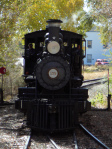
The Virginia and Truckee Railroad Steam Locomotive.
“My parents were very preoccupied during this time, trying to survive and keep their heads during conditions that were more dangerous and desperate to live with. However I continued with my childish lifestyle and behavior. To my way of thinking it appeared as if Mamusia and Tatu�� encouraged me to do whatever I wanted. They never said no to me, and whatever I decided to do that day I simply accomplished it.
I lived in my own fantasy world, often pretending to be one of those trains I greatly adored. I walked the streets like I was a train. Whenever I was free to roam the streets I moved like I was a train. When I encountered a corner on the sidewalk I slowed down, then chugged around it like it was a mountain pass. Then I increased my speed having successfully made the ��turn onto the straight-away. My world was fantasy trains and trolley’s, characters in my favorite Karl May action books, and of course movies. Movies were another joy I was prohibited from because I was a Jew. But, this didn’t stop me, or any of the other kids who ran wild on the busy Krak��w streets. Often we sneaked in at great risk of discovery. But, I loved movies so much it was worth the gamble.
I became friendly with a Jewish kid who lived across the street, with hair so blond it looked snow white. I called him Bia��y, Polish for”white”. He was an exact miniature of his father who had the same white hair. Whitey was a mean kid, but I liked playing at his apartment. His father and mother seemed to like me and I always felt welcome there. Whitey’s father was indulgent and his mother was a mouse. She was nice, but without a backbone at all. Whatever her son wanted he got. Mousey’s father was a very religious bearded older man. He lived with the family, praying all the time. Whitey and I loved to play nasty tricks on him while he was in one of his deep prayers. Usually, as the grandfather prayed, his daughter, who I called Mousey, would pour him a cup of coffee and leave it on the table in front of him. We did whatever thing we could think up to his coffee, we added salt, or pepper, whatever was on the table. Another time I dipped the tip of an umbrella in it, swirling the cream around. This resulted in a big mess with a puddle of coffee on the table, but he was so deeply involved in his prayer he didn’t notice the antics going on right under his nose. ��After his prayer he would take a gulp of coffee with great gusto, but then to our delight, splutter with disgust and spit it out in a long arching spray. Mousey, hearing the ruckus, shuffled in and squeaked,��“Get out of the kitchen and leave grandfather alone.” It was halfhearted at best because I could see she was trying to hold back her own laughter.
When we weren’t pestering the poor praying grandfather, we played one of the myriads of Whitey’s games. Monopoly was our favorite. Ours was a Polish edition with the street names from the city of Warsaw. Unfortunately for me, Whitey and his family moved out of the Kazimierz. They moved far out of town beyond the tram line. Whitey’s father saw that I wanted to keep visiting his son so he arranged for me to have a tramway pass, valid for one month. This pass allowed me to ride any tram without paying the fare. I was so happy even though I had to walk about two kilometers by foot, but we could continue our Monopoly game anytime we wanted.”
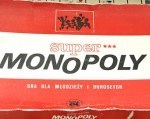
Photo credit: Michelle Staryos, The Rusty Curio (Etsy)
- Joseph Kempler, THE ALTERED I: MEMOIR OF JOSEPH KEMPLER, HOLOCAUST SURVIVOR.









